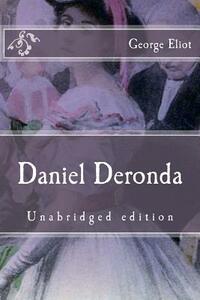Take a photo of a barcode or cover
Apparently the consensus of critics at the time was that the Jewish part of the story isn't as strong and that only Gwendolyn and her monster husband were really fleshed out. It's true that the proto-Zionism of Mordecai threatens to turn it into a novel of ideas, and I still think Mirah was a sap who failed to raise my interest, but I found myself sympathizing with Daniel Deronda as he explores the Jewish neighborhood and later Jewish religion and culture. Today, it's very common for someone like Deronda ... a relatively privileged young man who within his own class is disadvantaged because of his parentage or lack thereof ... who has an interest in social justice but no real program ... to take an interest in exotic peoples. I mean exotic for him of course. And then the ultimate wish fulfillment ... not so surprising ... he is Jewish after all! You could set the whole story in the Lower East Side of today, with the hipster discovering he is actually Puerto Rican ... and part Chinese! I didn't think Deronda was so flat or wooden, maybe George Eliot could have done more with him, but there wasn't the vocabulary back then to describe the contradictions in the kind of post-colonial fantasy Deronda pursues. Even so, he goes from being grossed out when a Jew touches him to being delighted to discover he's in the tribe, and I can get into a story like that. Although, yeah, the Victorian readers were also right, the Gwendolyn stuff is a lot stronger and racier and with higher stakes.
funny
hopeful
reflective
medium-paced
Plot or Character Driven:
A mix
Strong character development:
Yes
Loveable characters:
Yes
Diverse cast of characters:
Yes
Flaws of characters a main focus:
Yes
was removed from the Everand library, and it was hard to follow along. I think Aaron and I need to choose more snappy, memorable books to listen to together
Review after completing the novel:
A quick summary:
Gwendolyn and Daniel meet at a gambling club in Germany at the beginning of the novel, as Gwendolyn discovers the thrill of winning. Of course, before the night is out, she has lost a round, and when she returns to the house in which she is staying, she learns that her family has lost their home and their funds, requiring her to return from vacation immediately. Determined to save her family, Gwendolyn chooses to sell a brooch and to use the money to earn back their funds at the roulette table. She is subsequently shocked and a bit disturbed when the brooch is returned to her, understanding that it was repurchased by Daniel Deronda.
As it turns out, Deronda’s gesture is less a flirtation than an indication of his desire to save others, which continued to play out throughout the novel. He rescues Mirah from drowning herself, and he is drawn to Mordecai, the sickly bookseller who is seeking a learning partner and is struck immediately by Deronda. As the novel proceeds, we learn of Gwendolyn’s romances and eventual marriage to Grandcourt, a difficult, unsupportive man whose funds can keep her family in nice estates. We also see Deronda’s increasing fascination with Judaism and early Zionism, as well as his increasing desire to understand his own family origins, inspired perhaps by his attraction to Mirah, which he won’t admit even to himself until he discovers that it may be attainable. Indeed, as Gwendolyn’s story becomes more and more depressing, her husband drowning, ostensibly by her own hand, and her own attraction to Deronda becoming stronger just as his interest in her wanes, Deronda’s story becomes more joyful as he embraces his heritage and his future with Mirah. In fact, this sequence of events is surprising because on the surface it appears that Gwendolyn, now a wealthy widow, would be in a better position than Deronda, who descends from the ranks of a beloved ward of an English gentleman to the status of an abandoned, orphaned Jew.
I enjoyed the plot and, especially, the humor throughout the novel, though certainly in such a long book, a lot of the details and nuances got lost. I would love to listen to or read a discussion of the novel and its impact, but it seems rather understudied, unfortunately.
Review after completing the novel:
A quick summary:
Gwendolyn and Daniel meet at a gambling club in Germany at the beginning of the novel, as Gwendolyn discovers the thrill of winning. Of course, before the night is out, she has lost a round, and when she returns to the house in which she is staying, she learns that her family has lost their home and their funds, requiring her to return from vacation immediately. Determined to save her family, Gwendolyn chooses to sell a brooch and to use the money to earn back their funds at the roulette table. She is subsequently shocked and a bit disturbed when the brooch is returned to her, understanding that it was repurchased by Daniel Deronda.
As it turns out, Deronda’s gesture is less a flirtation than an indication of his desire to save others, which continued to play out throughout the novel. He rescues Mirah from drowning herself, and he is drawn to Mordecai, the sickly bookseller who is seeking a learning partner and is struck immediately by Deronda. As the novel proceeds, we learn of Gwendolyn’s romances and eventual marriage to Grandcourt, a difficult, unsupportive man whose funds can keep her family in nice estates. We also see Deronda’s increasing fascination with Judaism and early Zionism, as well as his increasing desire to understand his own family origins, inspired perhaps by his attraction to Mirah, which he won’t admit even to himself until he discovers that it may be attainable. Indeed, as Gwendolyn’s story becomes more and more depressing, her husband drowning, ostensibly by her own hand, and her own attraction to Deronda becoming stronger just as his interest in her wanes, Deronda’s story becomes more joyful as he embraces his heritage and his future with Mirah. In fact, this sequence of events is surprising because on the surface it appears that Gwendolyn, now a wealthy widow, would be in a better position than Deronda, who descends from the ranks of a beloved ward of an English gentleman to the status of an abandoned, orphaned Jew.
I enjoyed the plot and, especially, the humor throughout the novel, though certainly in such a long book, a lot of the details and nuances got lost. I would love to listen to or read a discussion of the novel and its impact, but it seems rather understudied, unfortunately.
reflective
slow-paced
Plot or Character Driven:
Character
Strong character development:
Yes
Loveable characters:
Yes
Flaws of characters a main focus:
Yes
challenging
reflective
slow-paced
Plot or Character Driven:
Character
Strong character development:
Yes
Loveable characters:
Complicated
Diverse cast of characters:
Yes
Flaws of characters a main focus:
Yes
adventurous
challenging
emotional
hopeful
inspiring
reflective
sad
tense
medium-paced
Plot or Character Driven:
Character
Strong character development:
Yes
Loveable characters:
Yes
Diverse cast of characters:
Yes
Flaws of characters a main focus:
Yes
emotional
reflective
medium-paced
Plot or Character Driven:
Character
Strong character development:
Yes
Loveable characters:
Complicated
Diverse cast of characters:
Yes
Flaws of characters a main focus:
Yes
Really enjoyed. Loved Deronda, found the characters largely lifelike and relatable. Shows an incredible amount of skill from George Eliot. Wish they ended up together though!
challenging
reflective
slow-paced
Plot or Character Driven:
A mix
Strong character development:
Yes
Loveable characters:
Complicated
Diverse cast of characters:
Yes
Flaws of characters a main focus:
Complicated
Continuing my love affair with 19th century novels....
I saw the mini-series adaptation long before reading the novel. In retrospect, the dramatization must have been fairly good, as while I was reading I remembered many of the scenes. This of course destroyed any surprise I might have felt while reading. However, it's still an enjoyable story with relatable and realistic characters. It's a bit long, with lots of asides about more philosophic topics, but was an entirely enjoyable read.
I saw the mini-series adaptation long before reading the novel. In retrospect, the dramatization must have been fairly good, as while I was reading I remembered many of the scenes. This of course destroyed any surprise I might have felt while reading. However, it's still an enjoyable story with relatable and realistic characters. It's a bit long, with lots of asides about more philosophic topics, but was an entirely enjoyable read.




